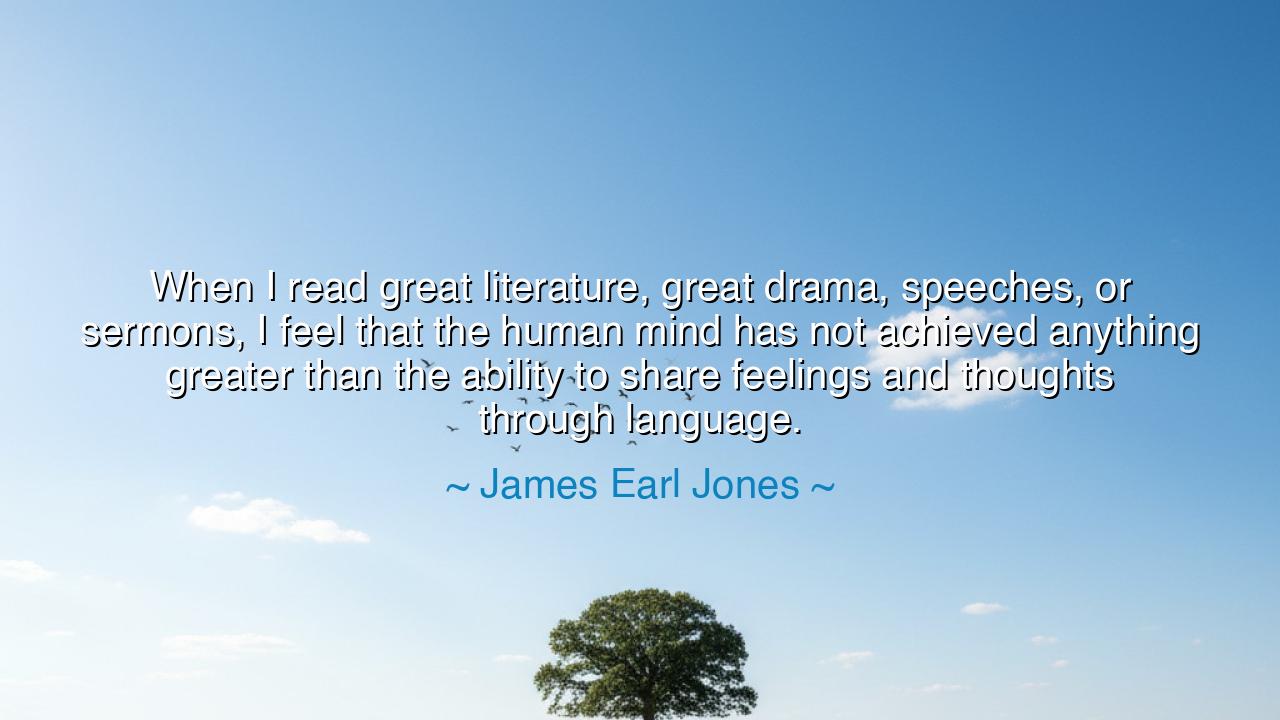
When I read great literature, great drama, speeches, or sermons
When I read great literature, great drama, speeches, or sermons, I feel that the human mind has not achieved anything greater than the ability to share feelings and thoughts through language.






In the words of James Earl Jones, “When I read great literature, great drama, speeches, or sermons, I feel that the human mind has not achieved anything greater than the ability to share feelings and thoughts through language.” These words are a hymn to the oldest and most sacred power of humankind — the power of language. From the dawn of our species, when the first fires flickered in the dark and stories were whispered to stave off fear, to the grand orations that have moved nations and hearts, language has been the bridge between souls, the vessel through which thought becomes immortal.
James Earl Jones, whose voice has carried the weight of kings and dreamers, speaks here not only as an actor, but as a philosopher of the spoken word. Having once struggled with stuttering, he understood better than most that speech is both miracle and mastery — a triumph of the mind and heart in unison. For him, to read or hear great words was to witness the highest form of human creation: the art of connection. Where architecture raises monuments of stone, and science pierces the mysteries of matter, language builds monuments of meaning — invisible yet eternal, crafted not of metal or marble, but of breath, rhythm, and thought.
In the ancient world, this truth was held sacred. The Egyptians believed that words possessed heka, a divine power capable of creation and destruction. The Greeks called language logos, the reason and order underlying the universe. The Hebrew scriptures declared that the world itself was spoken into existence — “Let there be light.” And indeed, every civilization that has ever risen from the earth has done so upon the foundation of the spoken and written word. For without language, there can be no teaching, no memory, no legacy. The voice is the thread that binds one generation’s wisdom to the next.
When Jones speaks of great literature, great drama, speeches, or sermons, he calls us to remember the many voices that have shaped humanity’s spirit. Think of Shakespeare, whose words illuminated the full spectrum of human emotion — love and betrayal, courage and despair. Think of Martin Luther King Jr., whose voice, ringing through the ages, transformed not just minds but destinies. Think of Socrates, who taught not by writing, but by questioning, by speaking, by awakening thought in others. Each of these, through the miracle of language, turned fleeting emotion into eternal truth.
Yet there is humility in Jones’s reflection — for he does not exalt human intellect for its inventions or its conquests, but for its capacity to share. The power of language is not domination, but communion. It is the means by which one soul reaches another, saying, “I have felt as you feel.” When we read great works or hear stirring speeches, we are reminded that across time and culture, we are not strangers. The heart of the poet in ancient Greece beats in the reader of today; the cry of freedom from centuries past echoes in our own hearts. Language is the thread of empathy woven through all history.
The lesson is clear: never take for granted the words we speak, the words we write, or the words we hear. Every sentence holds the power to wound or to heal, to divide or to unite. To use language carelessly is to squander the very essence of what makes us human. Let your words, then, be chosen with care and compassion. Read deeply, listen intently, and speak truth with reverence. For to master language is not to dominate others with rhetoric, but to connect — to honor the shared humanity that words make visible.
And so, children of voice and thought, remember this truth: the pen and the tongue are the twin instruments of creation. The house you build may crumble, the inventions you craft may rust, but a word spoken from the heart can outlive empires. Cherish your ability to speak, to write, to listen — for it is through these acts that the divine within you finds expression.
Thus spoke James Earl Jones, whose voice, like thunder softened by wisdom, reminds us that the greatest achievement of the human mind is not conquest or invention, but the sharing of the soul. Through language, we become eternal — not by power, but by understanding, not by force, but by the communion of hearts across the endless distances of time.






AAdministratorAdministrator
Welcome, honored guests. Please leave a comment, we will respond soon